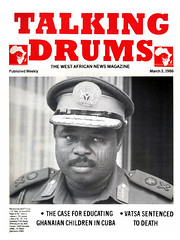What The Papers Say
Free Press, Ghana, February 14, 1986
Wanted, alternatives
It has been said that it is probably easier to stand aside as others cut a trail to point out to such pathfinders where they go wrong.In fact, since the PNDC launched its Economic Recovery Programme over three years ago, several groups and individuals have gone on record as criticising various aspects of the programme, genuine relief is not in sight.
In fact, as the months grow under the ERP, the purchasing power of a worker's salary dwindles with the outdooring of economic policies like the recent re-adjustments of the cedi to the dollar.
In spite of the grandiloquent pontifications about the success of the ERP by international observers who praise the ERP either out of diplomatic niceties or because they do not undergo the daily pains and pangs of Ghanaian workers, the reality is that things are not going the way we all desire, hence the criticisms. But we think merely pointing out faults of the programme or any other policies of the PNDC is not enough. We are of the opinion that the time has come for all those who have alternative proposals for the economic recovery of Ghana to come out.
For a country that prides itself on having produced a lot of skilled personnel, it is sad to note that not much is coming forth from our experts, both here and abroad.
There are several economists, bankers and statisticians who privately condemn the economic policies of the PNDC but fail to let the nation have the benefit of their knowledge by proposing those alternatives they believe will work the magic.
If there are such characters thinking that they will only offer their magic formulas only when they are in the saddle of power, let them be told things could have deteriorated to such a low point as to make their solutions totally ineffective by the time they get into power.
For many a government, the desire is to have the maximum and total support of the people. The basis of any government popularity is derived from good economic policies that bring relief to the people.
It is inconceivable and rare to see workers demonstrating as they did in Tema recently if their economic fortunes are good. Against such a background, we are convinced that Flt-Lt Rawlings' PNDC would willingly accept any alternative econ- omic package or suggestions for modifications to the present programme.
Let the call go forth today that all Ghanaians who can help shape out a better economic or any other channel, let the PNDC and people of Ghana have the benefit of their expertise.
National Concord, Nigeria, February 26, 1986
The National Identity Card Scheme
We had had an occasion in the past to commend the declaration by then Internal Affairs Minister, Major-General Mohammed Magoro (now retired) that the long-awaited national identity cards were finally to be ready for use, as from July, 1985. On May 28, 1985, however, just 35 days before the scheme was billed to take off, the same minister announced to the nation that the initially-stated commencement date was no longer realistic, on account of the rainy season that was soon to set in.Our support for the identity cards scheme, now as then, is reinforced by our conviction that once in operation, it could serve an invaluable security purpose. By identifying who is a citizen (and who is not), the scheme could effectively curb the infiltration of illegal aliens into the country, thereby forestalling the re-occurrence of such religious uprising in the past, which were said to have been organised by such elements. In lieu of national passports, the scheme could also go a long way in minimizing the often-reported cases of embarrassment, physical manhandling and detention of border-resident Nigerians by immigration officers, frequently caused by uncertainties as to the suspects' identities.
Within the country, there can be no doubt that the operation of the scheme would help the security and law-enforcement agencies in their apprehensions, arrests and interrogation of suspected criminals, and also spare many innocent citizens the embarrassment, ill-treatment and humiliation that sometimes arise from mistaken identities. Furthermore, given the marked dearth of demographic data in the country, the operation of a national identity card scheme could greatly assist both the National Population Commission and the Ministry of National Planning in their compilation of such national statistics, as could provide the basis for future development plans.
Against the background of the aforestated reasons, we welcome once again, the recent indication by the Internal Affairs Minister, Lt-Col John Shagaya, that the national identity card scheme would finally be inaugurated next year. According to the minister, 90 per cent of the project has already been completed and all machines required for the scheme are now awaiting shipment from abroad.
Much as we are prepared to take the minister by his word, we cannot but point out that so much money has already been sunk into the project, and so much time wasted on it, that any further delay could turn the entire scheme from a national asset to something of a national liability. Since 1982 when a N56 million contract was first awarded for the scheme, it has over the past four years gulped more than N70 million in hard currency. But at a time when the nation's purse has grown so lean, and under a regime that has committed itself to the twin principles of cost- effectiveness and accountability, we urge the present administration to proceed full-speed ahead towards the identity cards dream into a manifest reality.
Finally, as the scheme is intended to cover only persons aged 10 years and above, and given the understandably limited scope of the demographic statistics derivable from it, we urge the government to follow up its efforts with definite plans towards a nationwide and a comprehensive vital registration scheme.
